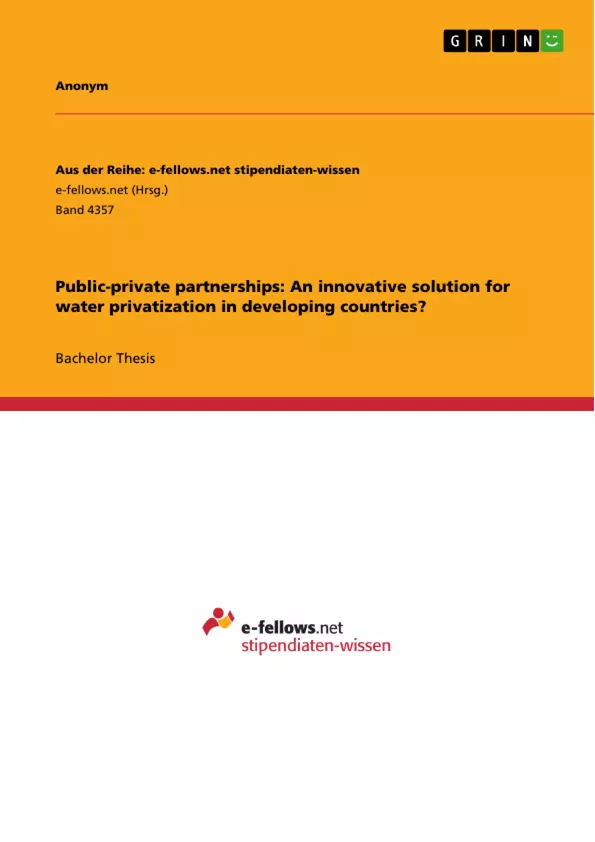Water is a vital element for human life and its wellbeing. And still, millions of people living in developing countries lack access to quality water services. Governments of those countries simply do not have enough financial resources to build up or improve water infrastructure, but it is their responsibility to ensure that water also reaches the poorest. Private companies, on the other hand, are able to provide financial resources, capacities and know-how to design, build, operate and finance water utilities. This leads to the question if public-private partnerships (PPPs) would be an innovative solution for water privatization in developing countries?
This thesis analyses the main benefits and risks of a PPP in the water sector in developing countries. In addition, the process of the water concession of Metro Manila, Philippines represents an interesting study case to discuss further the advantages and risk factors that were described in the literature. The conducted interview contributes to the research by gaining insights about up-todate information such as current water PPP projects.
Inhaltsverzeichnis (Table of Contents)
- Abstract
- 1 Introduction
- 1.1 Problem statement
- 1.2 Relevance
- 1.3 Motivation and research question
- 2 Background
- 2.1 Defining PPP and its variety of forms
- 3 Methodology
- 3.1 Literature Review and Selection Criteria
- 3.2 Interview with expert in the water industry
- 4. Benefits and Risk factors of PPPs in the water sector in developing countries
- 4.1 Benefits
- 4.2 Risk factors
- 5. The case of Manila Water Company, Inc
- 5.1 Manila Water Company, Inc
- 5.2. PPP Process
- 5.3 Lessons learned
- 6. Discussion
- 7. Conclusion
- 7.1 Contribution
- 7.2 Limitations
- 7.3 Future Research
- References
Zielsetzung und Themenschwerpunkte (Objectives and Key Themes)
This thesis aims to analyze the potential of public-private partnerships (PPPs) as an innovative solution for water privatization in developing countries by discussing the advantages and risk factors associated with these partnerships in the water sector. The research explores the effectiveness of PPPs in improving water services and achieving sustainable water management in developing nations.
- The benefits and risks of PPPs in the water sector of developing countries
- The role of governance and transparency in the success of PPPs
- The impact of water privatization on the accessibility of water services for the poorest populations
- The importance of robust contract design and effective communication between partners in PPPs
- The lessons learned from the case study of Manila Water Company, Inc. in the Philippines
Zusammenfassung der Kapitel (Chapter Summaries)
The introduction provides a comprehensive overview of the global water crisis and highlights the importance of ensuring access to safe drinking water for all. It introduces the concept of public-private partnerships (PPPs) as a potential solution for addressing the water crisis in developing countries, outlining both the benefits and risks associated with this approach. The chapter explores the historical context of water privatization and the increasing prevalence of PPPs in the water sector.
Chapter 2 delves into the definition of PPPs and the diverse forms they can take in the water sector. It examines the motivations and goals behind the adoption of PPPs, particularly in developing countries.
Chapter 3 details the methodology used in the research. This includes a literature review, outlining the selection criteria for relevant studies and highlighting the key themes explored in the research. Additionally, the chapter discusses the importance of conducting an interview with an expert in the water industry to gather up-to-date information on current PPP projects.
Chapter 4 focuses on the benefits and risk factors associated with PPPs in the water sector of developing countries. The chapter examines the advantages, such as increased financial resources and technical expertise, and the potential risks, including issues related to transparency, governance, and the potential for social exclusion.
Chapter 5 presents a case study of Manila Water Company, Inc. in the Philippines. This chapter provides an in-depth analysis of the company's PPP process, highlighting the key elements of the partnership and examining the lessons learned from the experience. The chapter explores the effectiveness of the PPP in improving water services for the Manila population.
Schlüsselwörter (Keywords)
The core focus of this thesis revolves around public-private partnerships, water privatization, developing countries, water governance, benefits and risks of PPPs, case study, Manila Water Company, Inc., water infrastructure, water services, sustainable development, and social equity.
- Quote paper
- Anonym (Author), 2023, Public-private partnerships: An innovative solution for water privatization in developing countries?, Munich, GRIN Verlag, https://www.grin.com/document/1450621



